"Strange Apparitions": Hugo Strange returns from the dead, goes back, then kinda returns again (?)
First things first: who here *hasn't* read the Batman story arc Strange Apparitions (the legendary comic arc by Steve Englehart, most famous for including the all-time great Joker story, The Laughing Fish)?
If you haven't--or if you've only read Fish on its own but not the surrounding story--you should at least know that it's generally considered one of the finest Batman stories of all time. I certainly agree, but I don't want to oversell it as a work, since hyped expectations have killed many a great story. I can at least safely presume to call it one of the most important and influential Batman comics of all time, and for that alone I urge you to track down the trade paperback.
Or at least, I would, if it weren't out of print. WTF, DC?
I was actually tempted to post the entire storyline here, but I had a hard enough time singling out the Hugo Strange subplot while keeping these scans under the 1/3rd limit. The story is just that tight, with each issue packed to the gills with plot, action, and character stuff.
So with regret, let's eschew the excellent stories of Bruce and Silver St. Cloud's affair, of the introduction of Dr. Phosphorus and the reintroduction of Deadshot, of the thieving Penguin and tragic Clayface III, and even of the greatest Joker scheme of all time.
Instead, let's focus on the grand return of Batman's first arch-nemesis, and the scheming villain who made the damn fool mistake of crossing him:
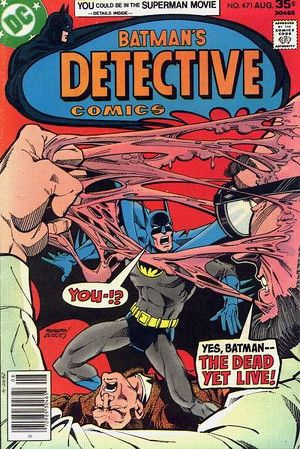
These scans (encompassing Detective Comics #471-476) begin with the story already in progress, so I'll let one of our key players fill you in on the events:
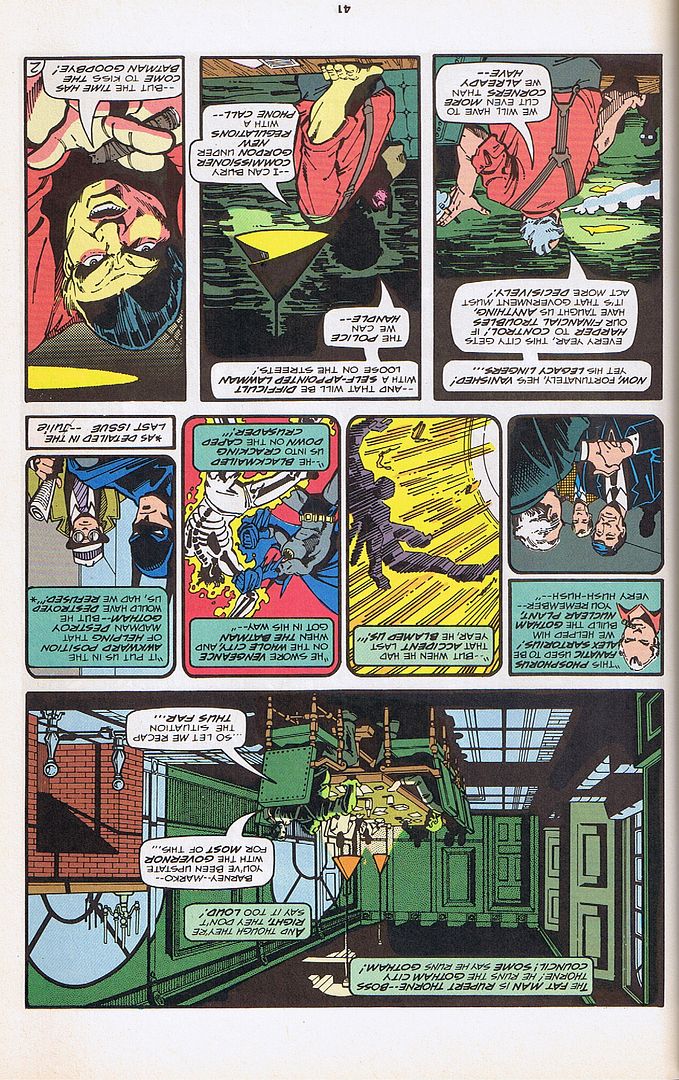
So Thorne and the council plot to finish off Batman, not realizing that he didn't come away unscathed from his battle with Dr. Phosphorus:
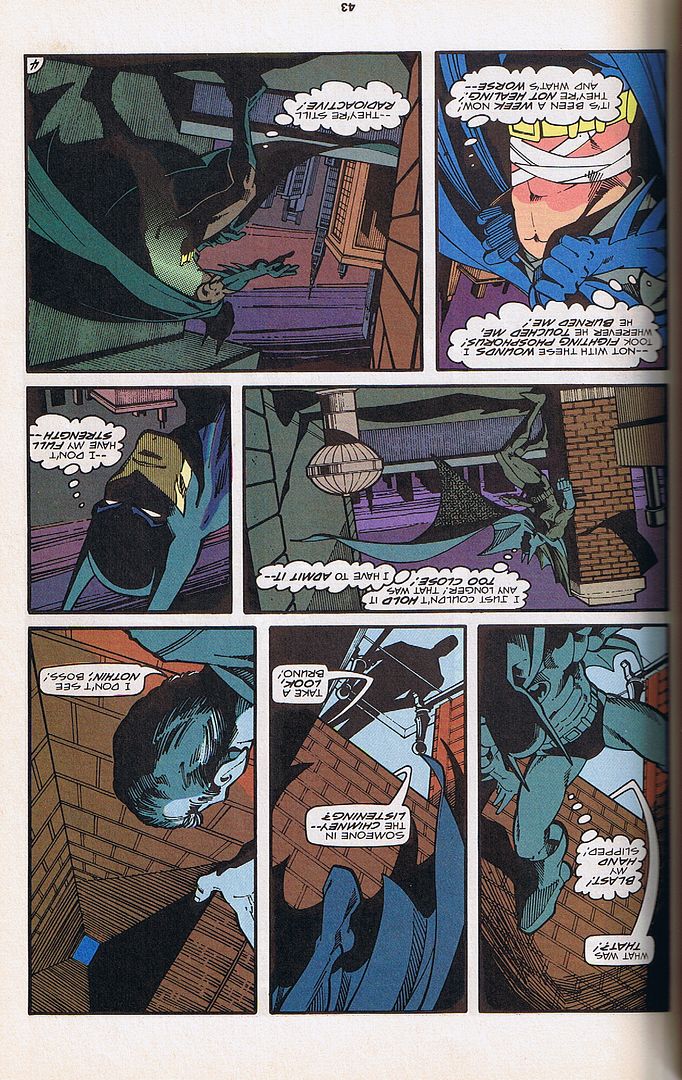
These days, Batman would take his problem to someone else in the super-community like Dr. Mid-Nite or, hell, maybe even treat himself because he's the Bat-God of Medicine or something. But no, Bronze Age Bruce has a different plan:
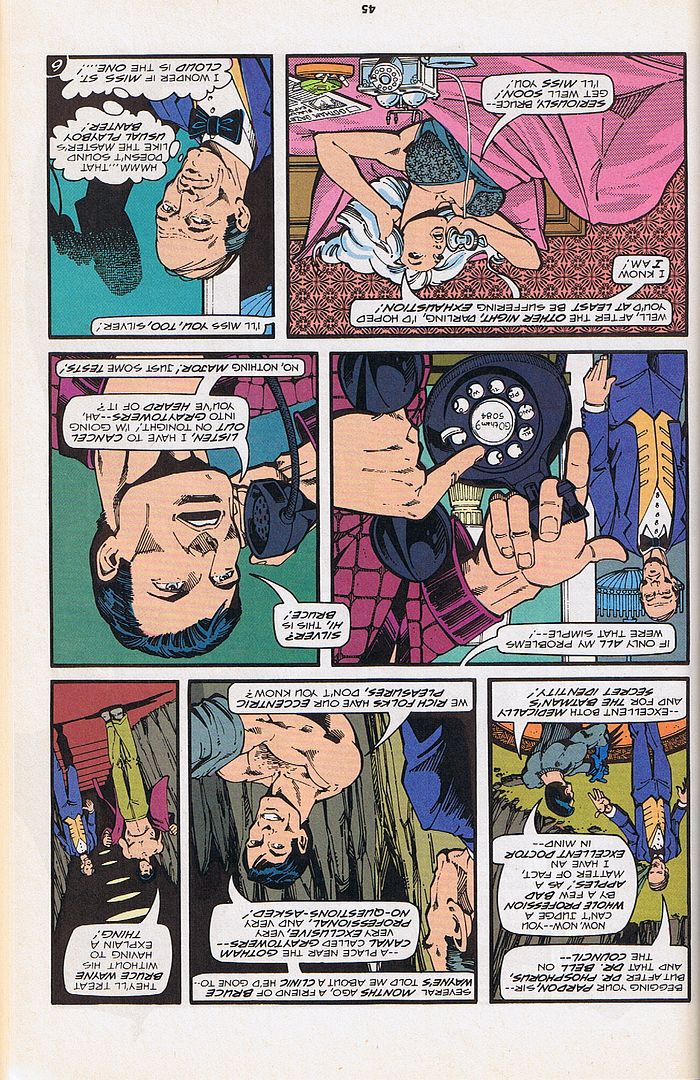
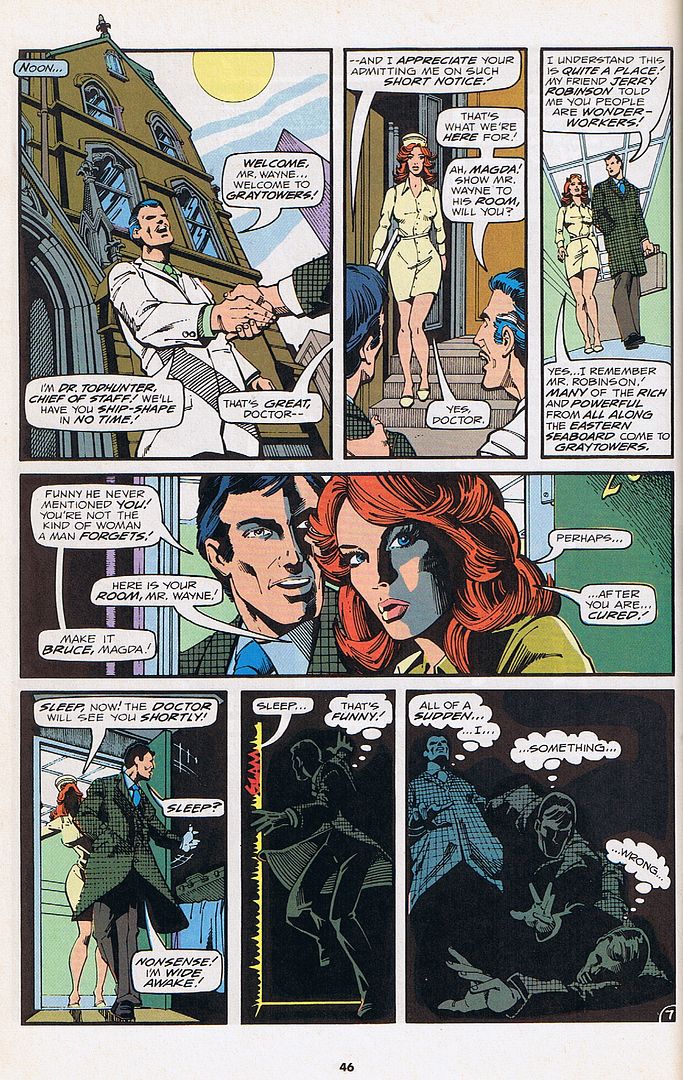
***cue an awesome full-page Marshall Rogers nightmare image that I had to cut for page limit restrictions***
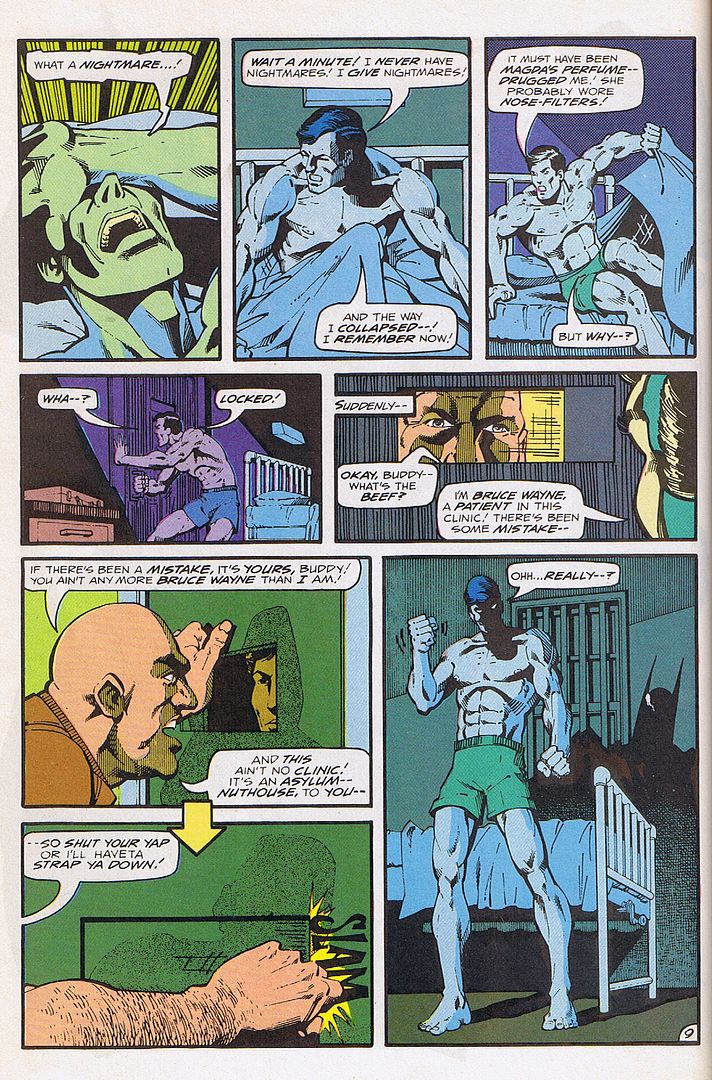
Producing a costume that he'd kept in a hidden compartment, Batman manages to melt the bars and escape his cell:
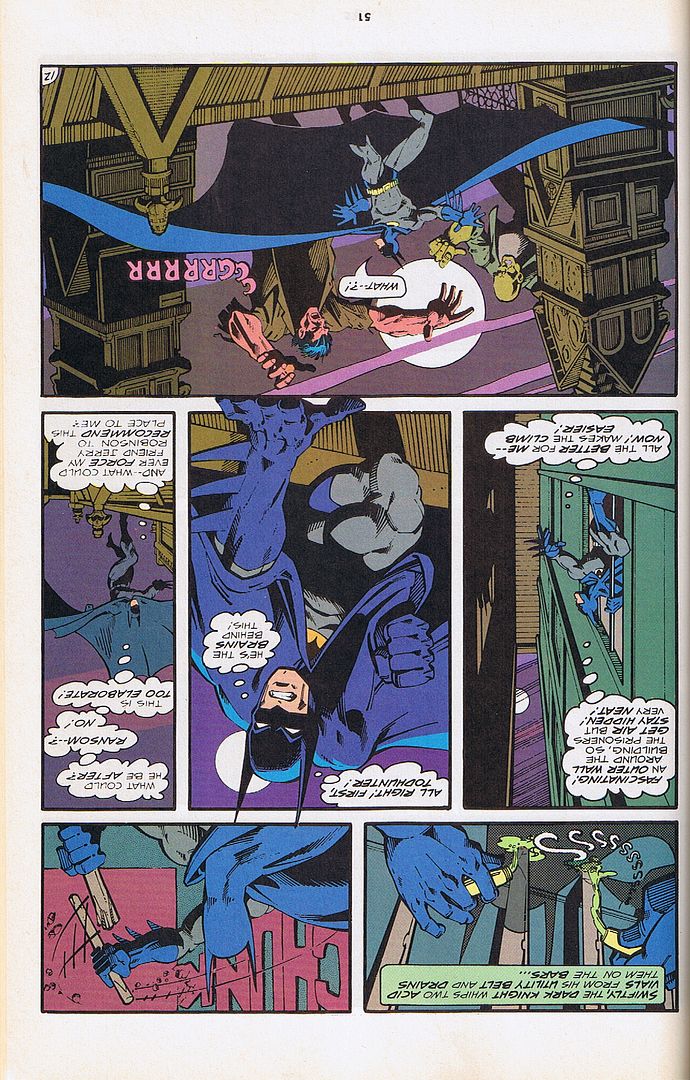
Yep, it's a pair of Monster Men! Which means that Dr. Todhunter is really...


... wait, he has trained attack snakes? I'd say that's silly, but Hugo is so gloriously old-school arch-villain that I can accept it. He'd surely climb the ranks in the Guild of Calamitous Intent.

Of all the villains who've had Batman unconscious and at their mercy, Hugo was the only one with the insight to go, "Hey, maybe I should unmask this guy! God, I'm smart!"
This makes Hugo the second villain to have learned Bruce's identity, the first being Ra's al Ghul. But as much of a threat Ra's is, he never really exploited the secret identity. Now, if any of the other villains discovered that Bruce was Batman, they'd likely just use it as a means to destroy their enemy.
What sets Hugo apart is that he has a far grander goal in mind:
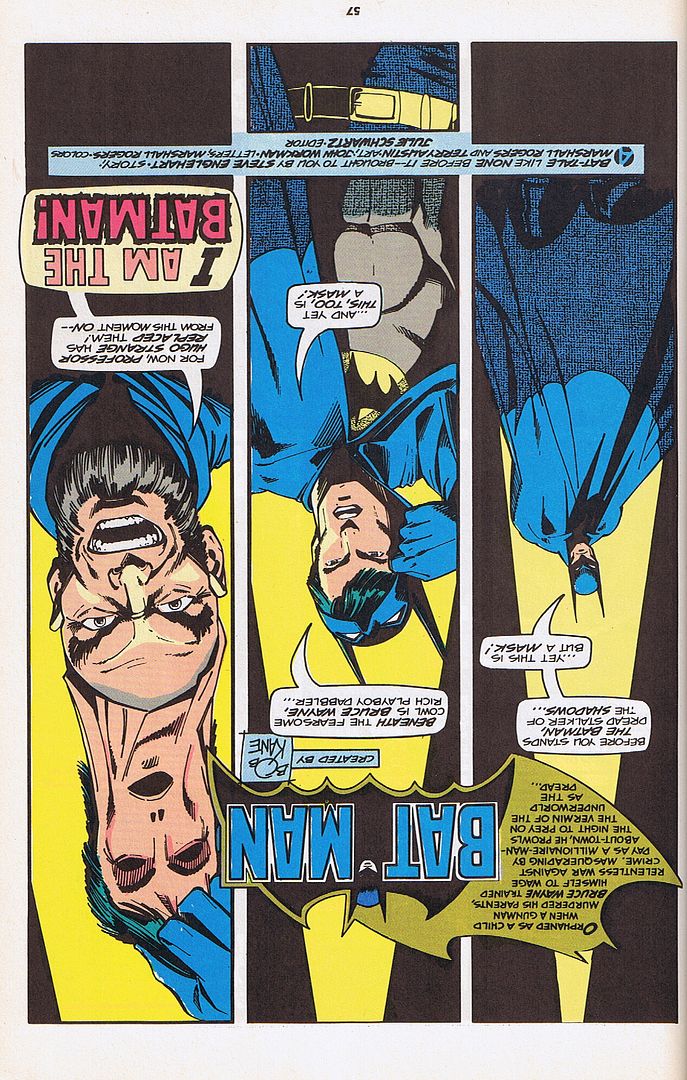
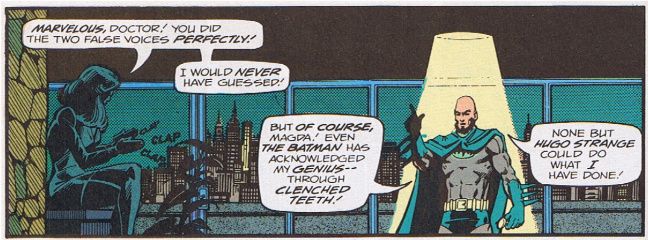

For the second time, we learn what Hugo had been doing since his faked death: he was a highly successful professional criminal in Europe.
In the previous post, jlroberson and I discussed how easily Hugo could have been used in place of Dr. Hurt in Grant Morrison's Batman R.I.P. (keep reading these posts and you'll notice more and more ways that Hurt has cribbed from Strange). If they had, one could easily imagine that Hugo spent those years amassing power with the Black Glove criminals. Major missed opportunity, that.
Furthermore, Dr. Hurt isn't the only so-called "ultimate Batman villain" to have ripped off Hugo. Take Hush, for instance, and the fact that Hugo pulled his scheme way earlier while still being a far more interesting character in the process:
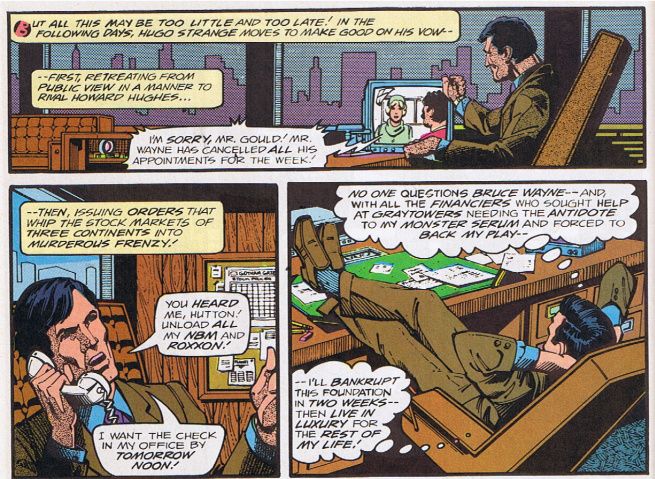
Hugo's got everything planned out, even going to far as kidnapping Alfred and throwing him in the cell with Bruce. Robin's on the case, but Hugo's one step ahead of them the whole way:
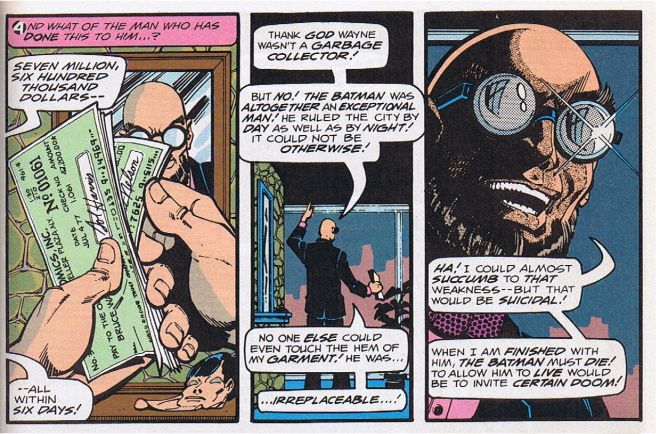
Awww, does Hugo have a bit of a hate-crush on Batman? Actually, yes, yes he does.
Resisting these strange new feelings, Hugo grabs a pair of Monster Men and--dressed in his best evil finery--holds a sinister auction:

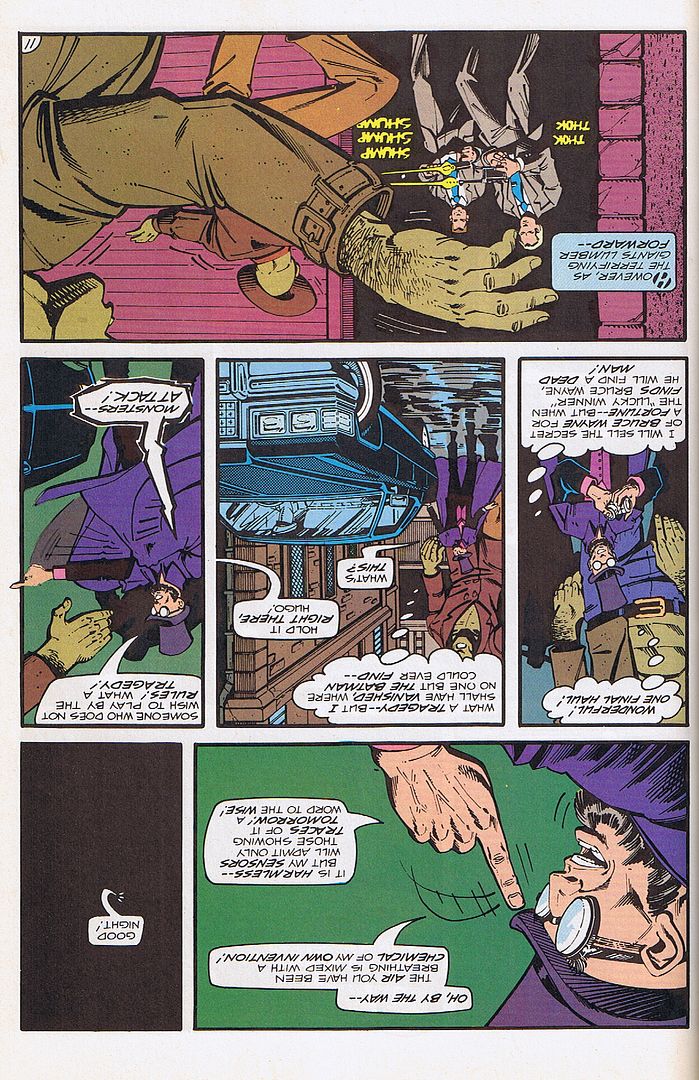
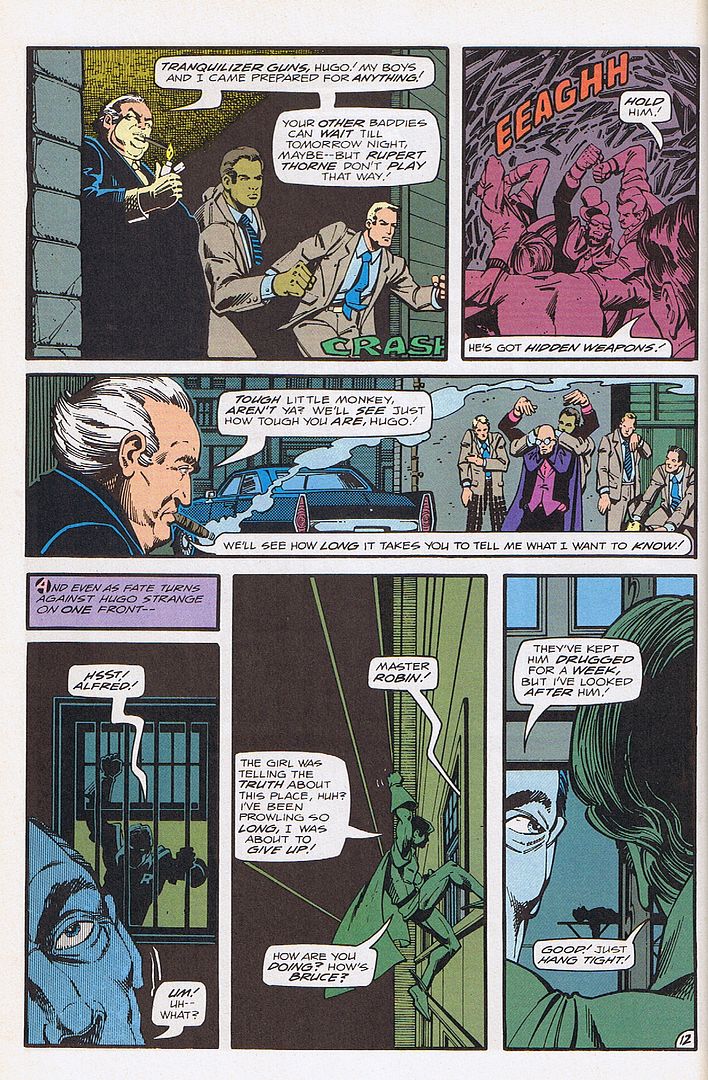
See, that's the big problem with Hugo's plan here: involving other villains he can't command.
Now, it wasn't necessarily stupid to involve the Joker and the Penguin. Yes, screwing them over would be inviting suicide, but Hugo's already proven himself smart and capable enough of actually, possibly getting away with it.
Besides, Hugo's line about "play by the rules," indicates more than just the rules of his own personal game. Indeed, it's a game that Hugo, the Penguin, and the Joker all play with Batman in their own ways, a game that a crass thug like Rupert Thorne could never understand.
Only too late does Hugo himself come to this realization:

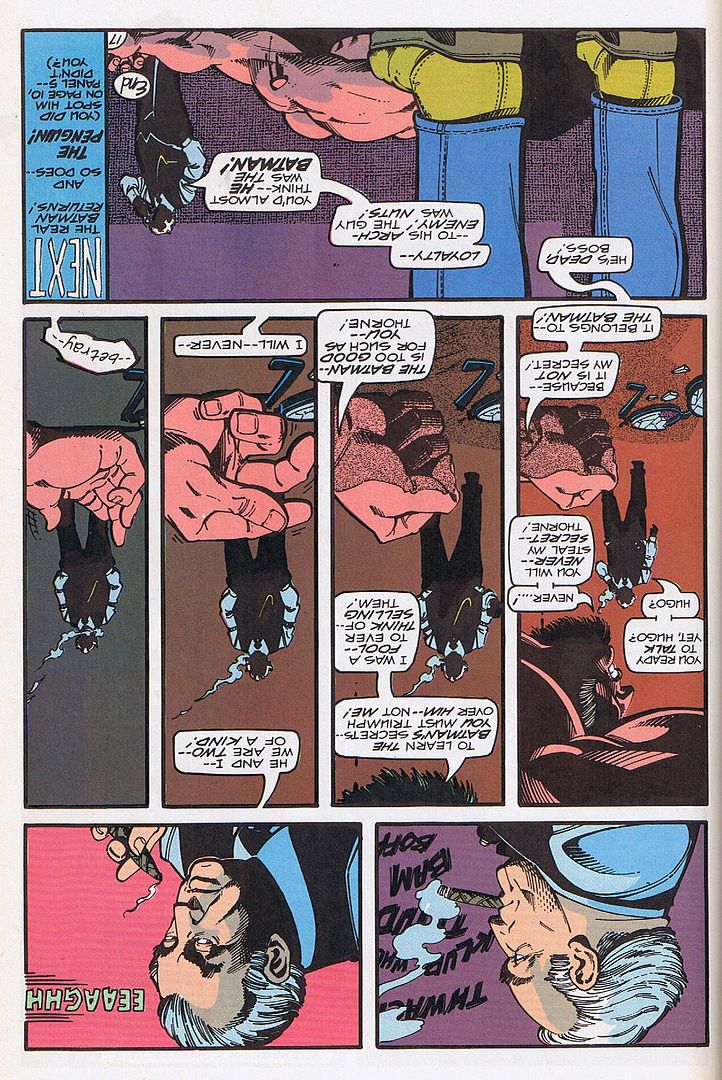
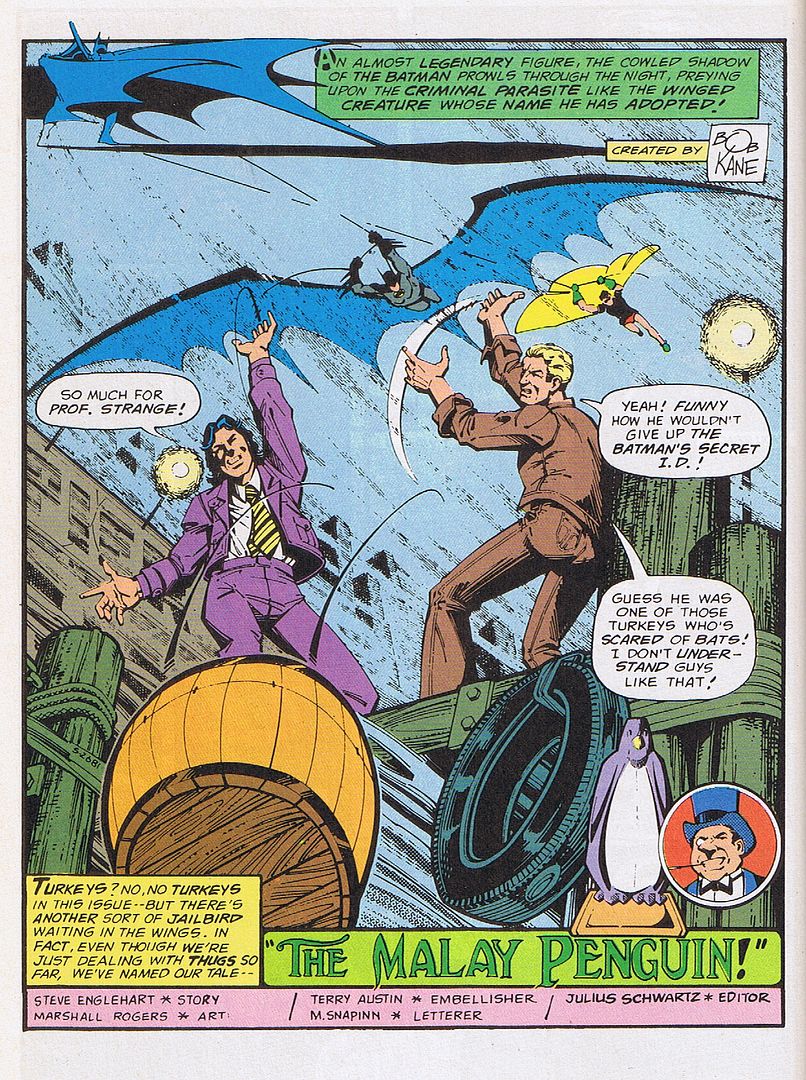
Batman and Robin bust the thugs for being Rupert Thorne's men, then immediately start wondering where he hell Hugo Strange has gone. Man, the guy dies, and no one notices!

Oh, shut up, Dick. ... Sorry, force of habit.
So Hugo actually healed Bruce! Why, if he was already planning to kill Bruce and leave a corpse for the "lucky winner" to find? Did Hugo have a change of heart? If so, when? Did he cure Bruce's radiation so he, Hugo, could have the entire pleasure of Batman's murder himself? Or was his subconscious admiration for Batman just too great?
Perhaps the more pressing question is this: if Hugo's finally dead, why do I still have a bunch of scans from this storyline?
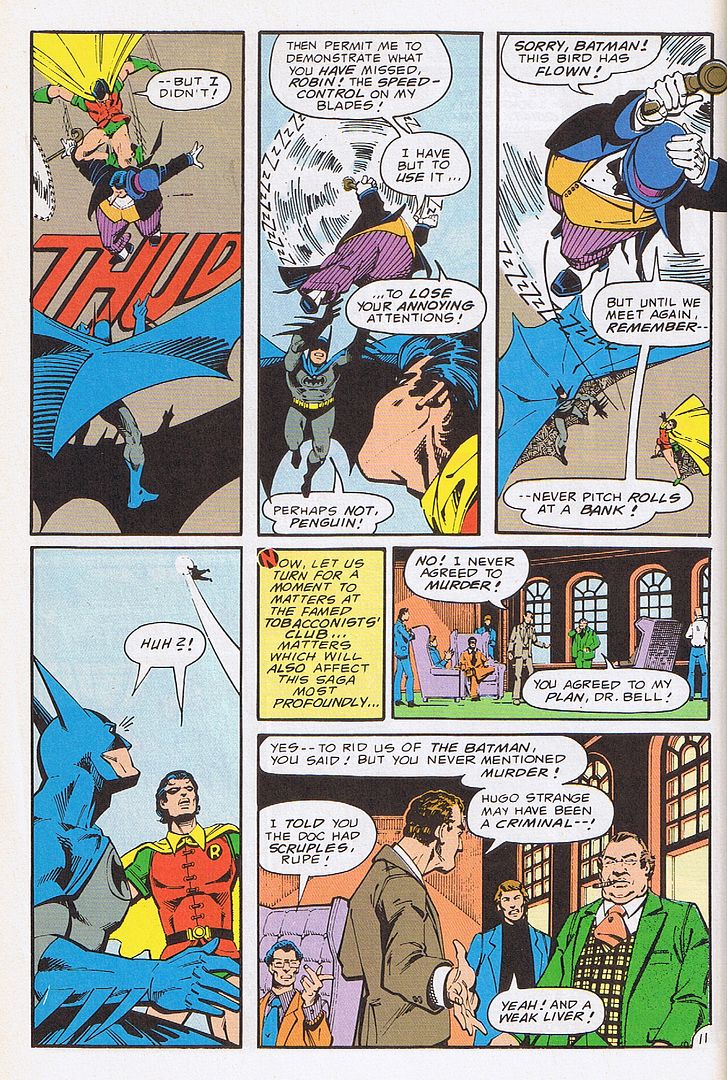
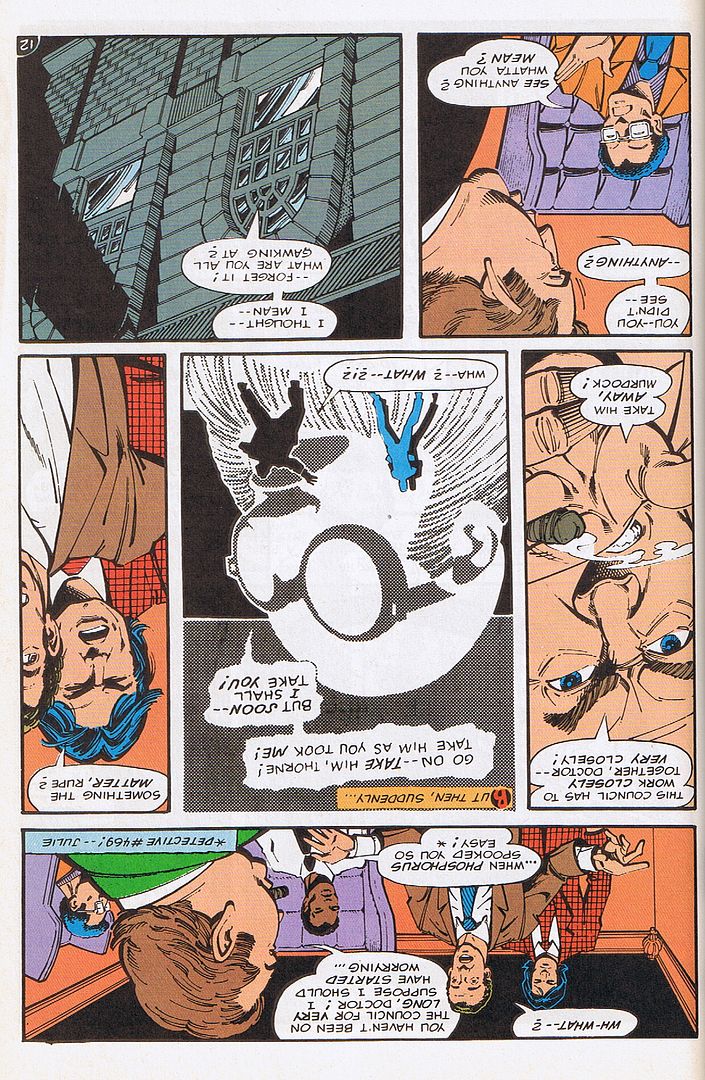
Later, amid the return of Deadshot (in the story which gave him the costume he still wears to this very day), Batman decides to pay Thorne a personal visit:
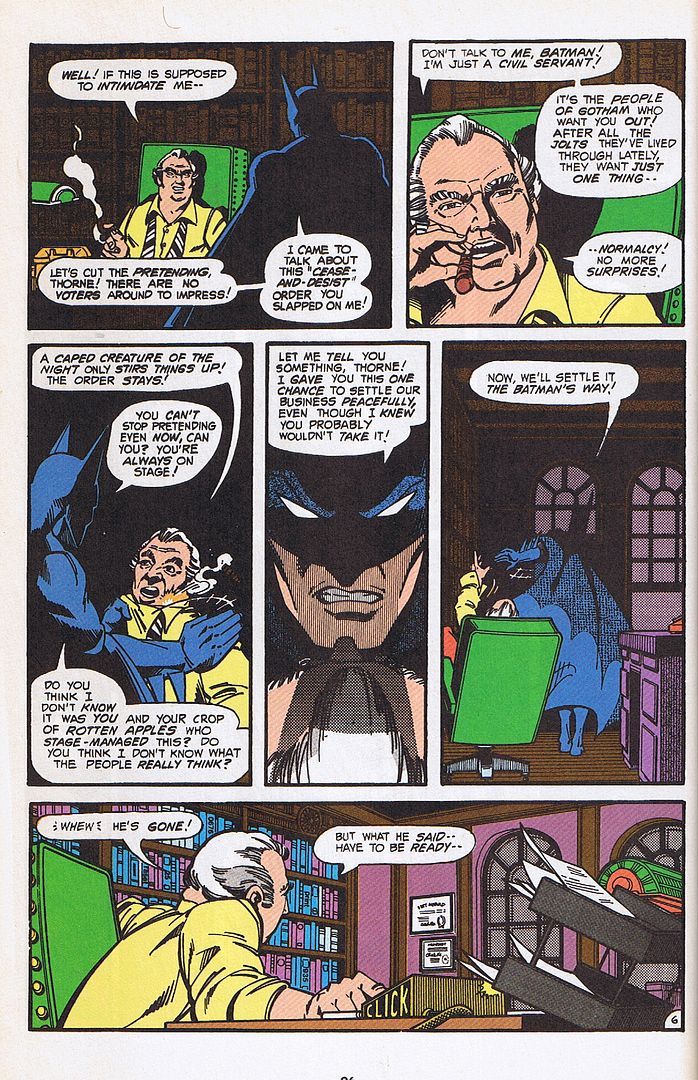
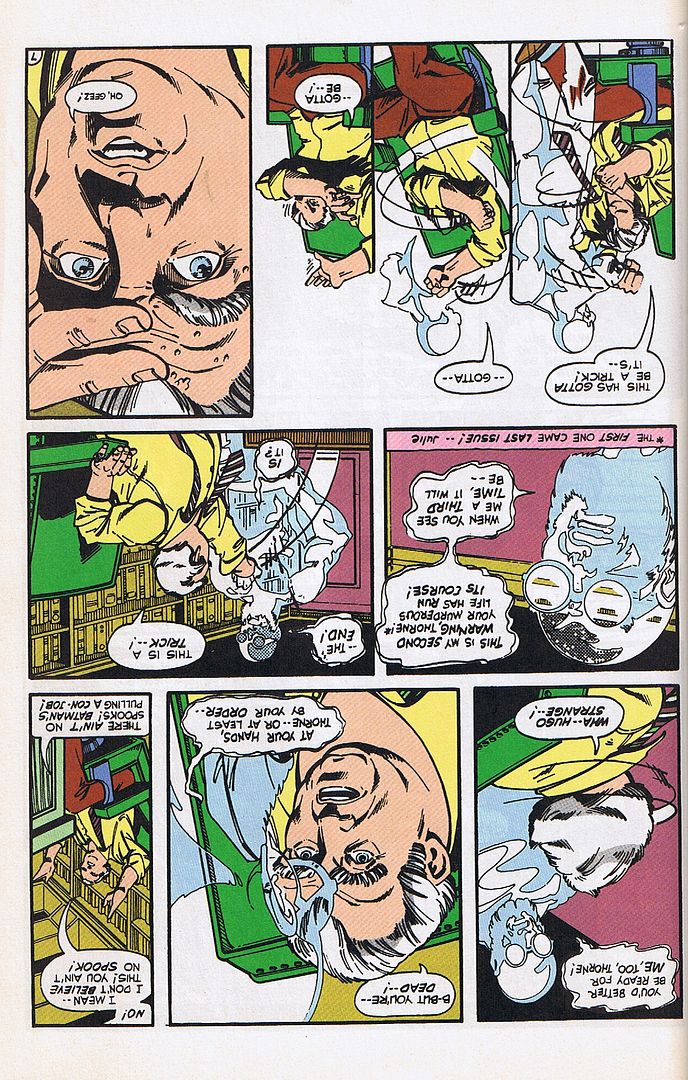
I like how Ghost?Hugo is naked, but still wears glasses. Guy has his priorities, even when he's dead.
We're breezing past an awful lot of story to focus on the Thorne subplot, story which mainly involves the romantic drama between Bruce and Silver St. Cloud, who has also discovered his secret identity.
And it all comes to a head when the Joker finally emerges in The Laughing Fish, a story which--if you haven't read it or seen the episode--features the Joker killing off bureaucrats because he cannot legally trademark fish. I could explain more, but really, do you need me to?
I was seriously tempted to post the Fish storyline here, but this post is long enough as it is. So instead, let's check in with ol' Rupe:
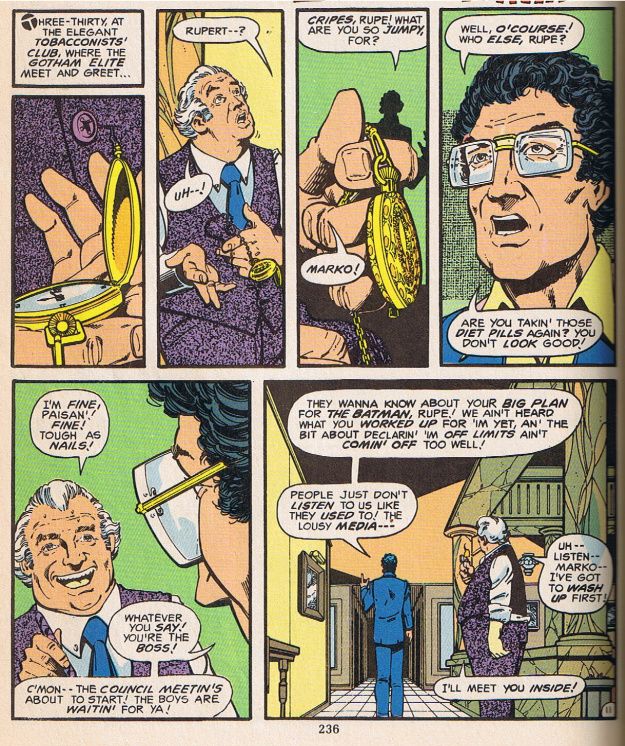
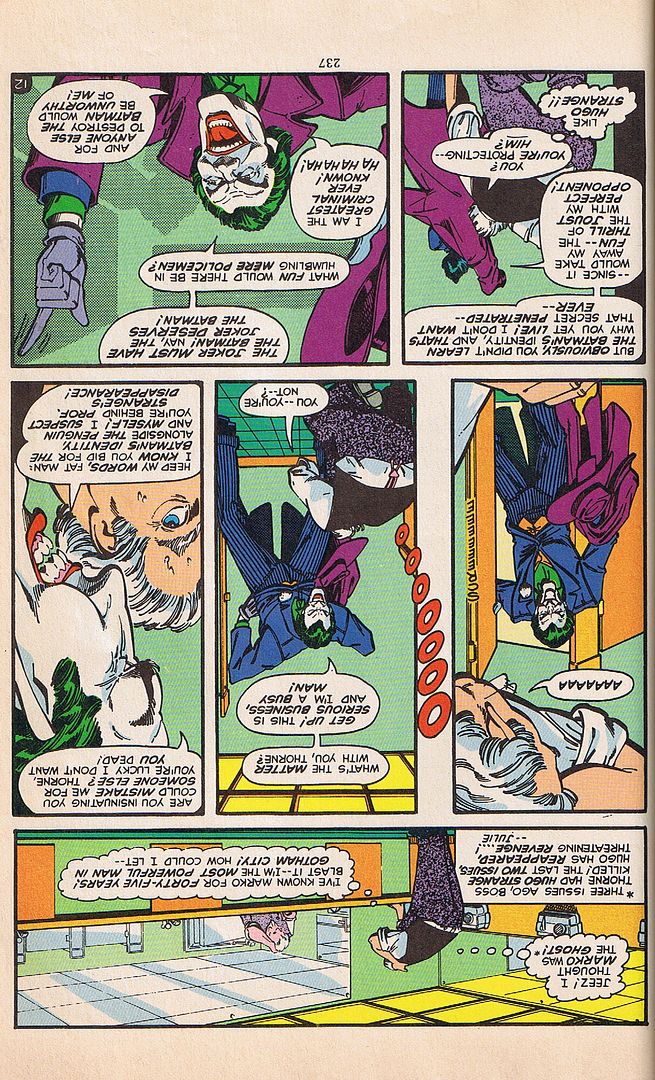
Yes, Rupe, just like Hugo Strange! Because Hugo and the Joker both understand something that you never could. They understand--and adore!--the game they play with Batman.
By the way, even from the snippet of a story, I honestly think Englehart's Joker to be my favorite Joker of all time. Somewhere between this and TAS Joker is my ideal Mr. J, mainly because his schemes actually follow an insane pattern of logic, only the absurd logic of an actual joke. He's genuinely absurd, and genuinely terrifying.
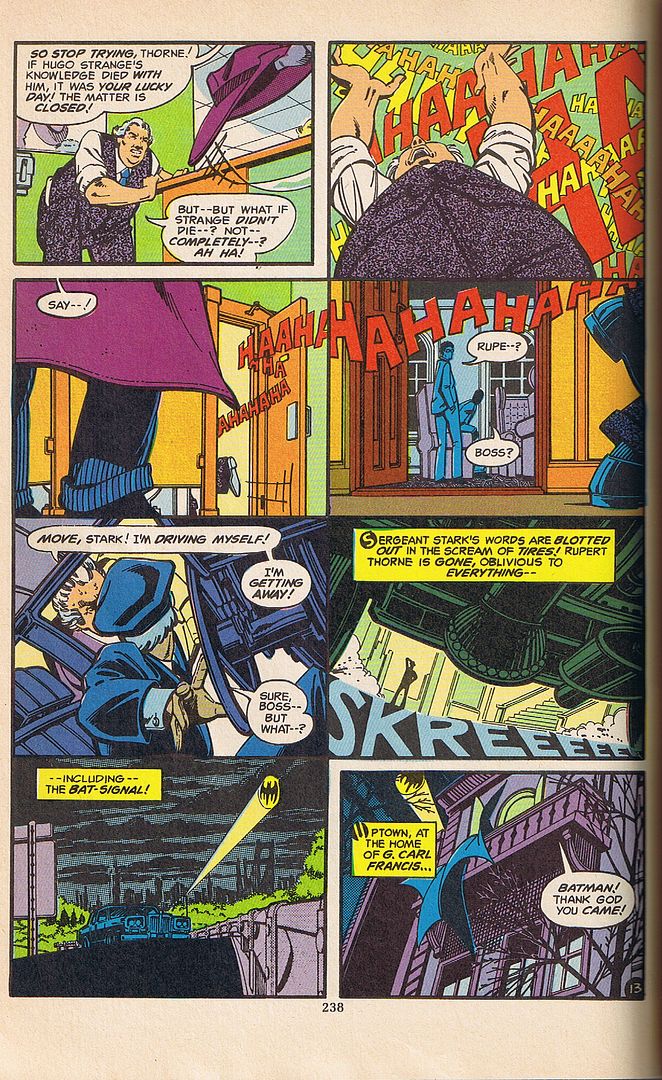
"... but the Batsignal!" As Thorne drives off, the Joker claims two victims, and names Commissioner Gordon as his intended third. Frustrated at his second failure, Batman searches around the crime scene for any clues he can find:
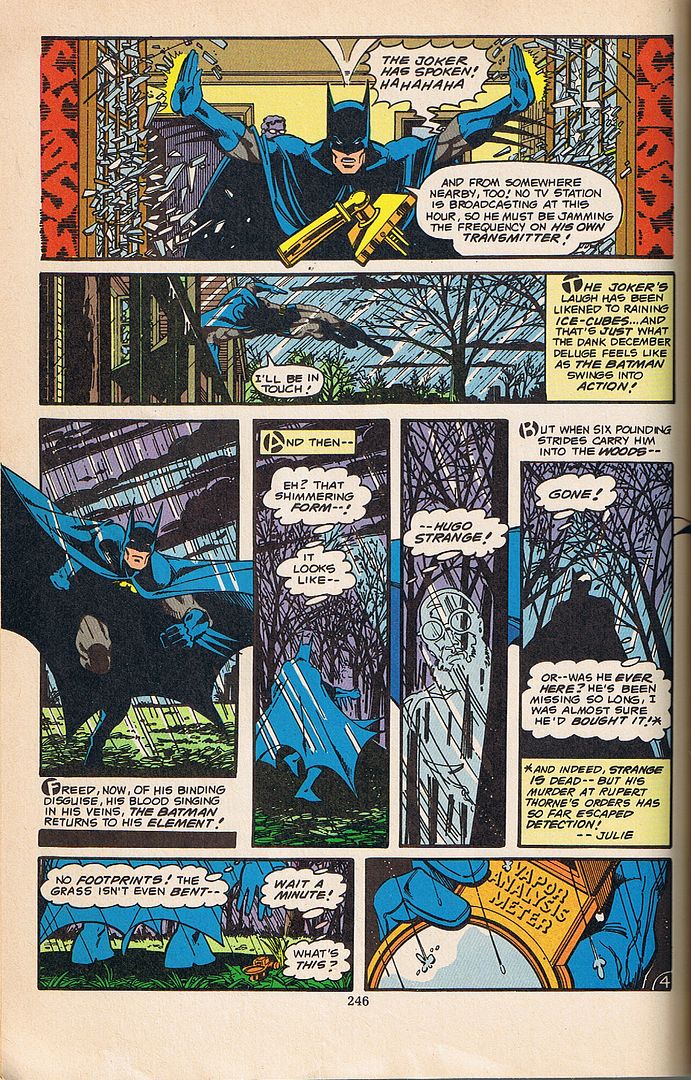
Since Hugo is officially dead (as I gather from the editorial note by Julie Schwartz), and Batman can see the ghost, then the only possible answer is that it truly is Hugo's spirit and not Rupert Thorne hallucinating. In fact, it's a spirit that's taking an active interest not just in Thorne, but in Batman's investigation. Why?
As Batman wonders that himself, I hope you'll forgive my indulgence in including one more bit of Englehart's Joker:
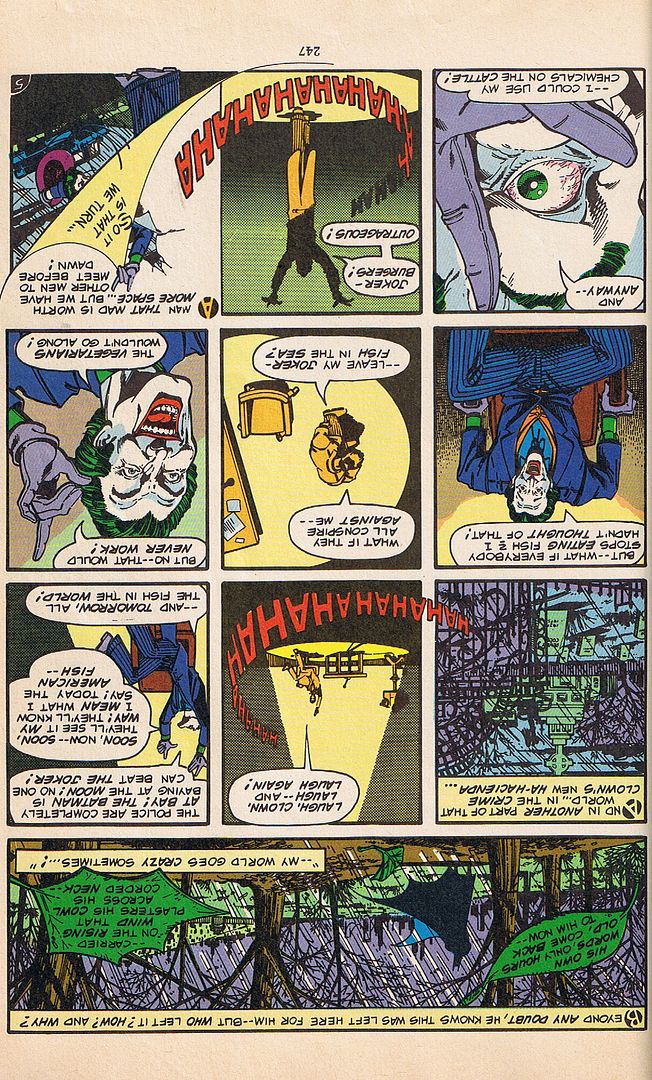
... to Rupert Thorne, still driving to the middle of nowhere, desperate for any companion to take his mind off Hughost.
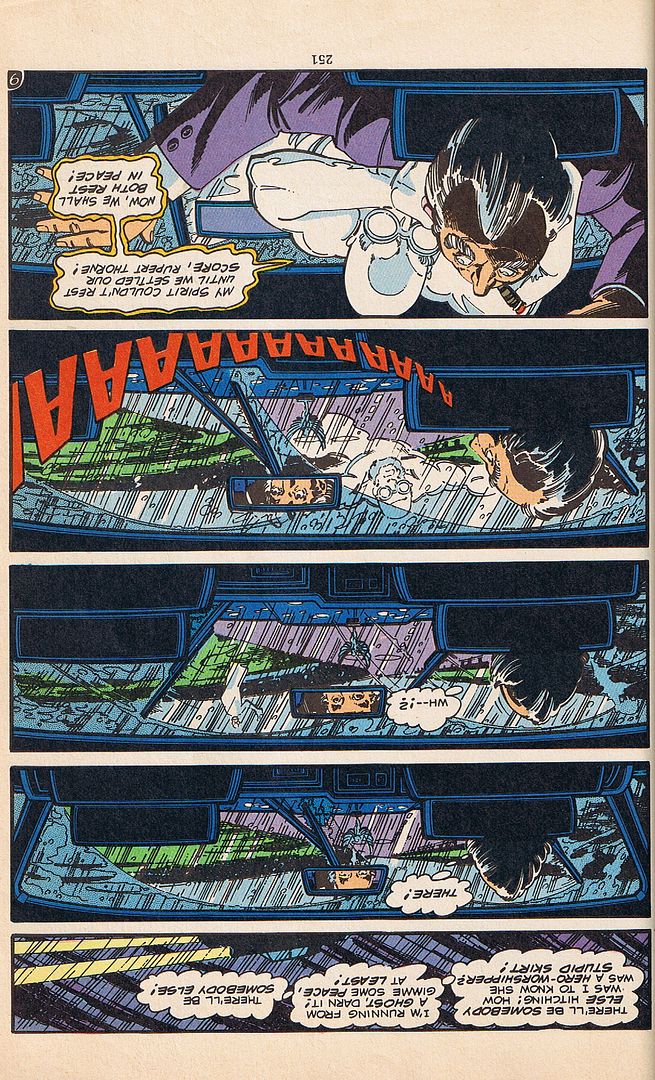


So Hughost helped Batman capture the Joker? Why? What did Hugo have to gain by helping Batman defeat the Joker? Was it out of pure respect from beyond the grave? In dying, did Hugo himself attain some form of redemption? Perhaps his brief time inhabiting Bruce's life made more of an impact on Hugo than he'd expected. Either way, we get no answers, and it's that ambiguity which gives this story so much of its lasting power.
By the end, Bruce saves the day, but loses the woman he loves:
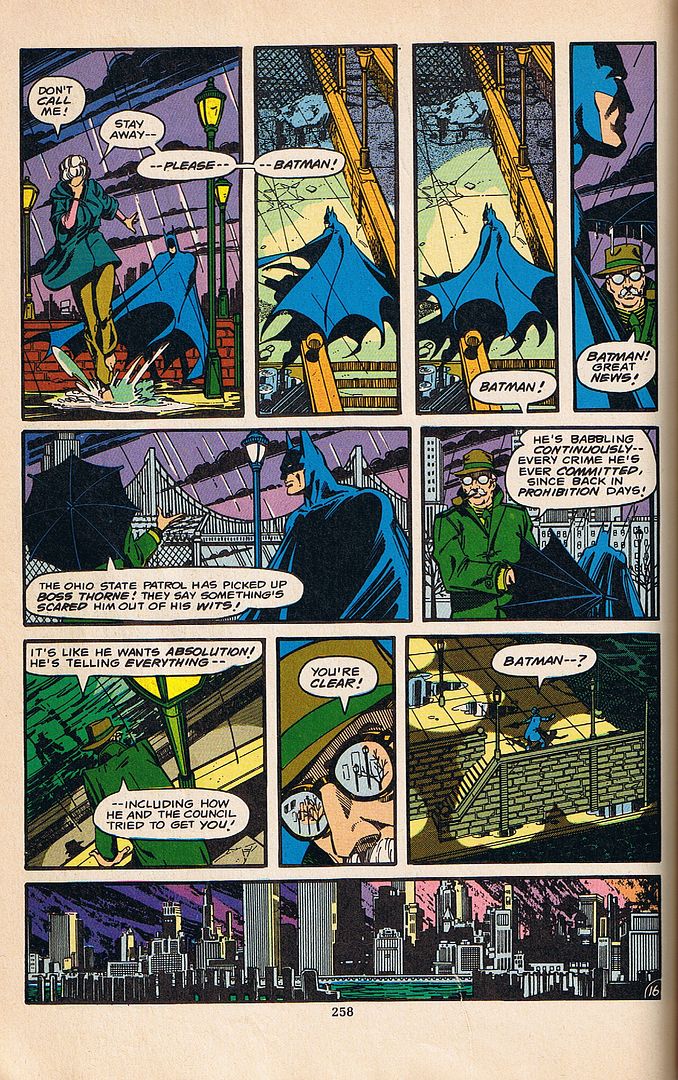
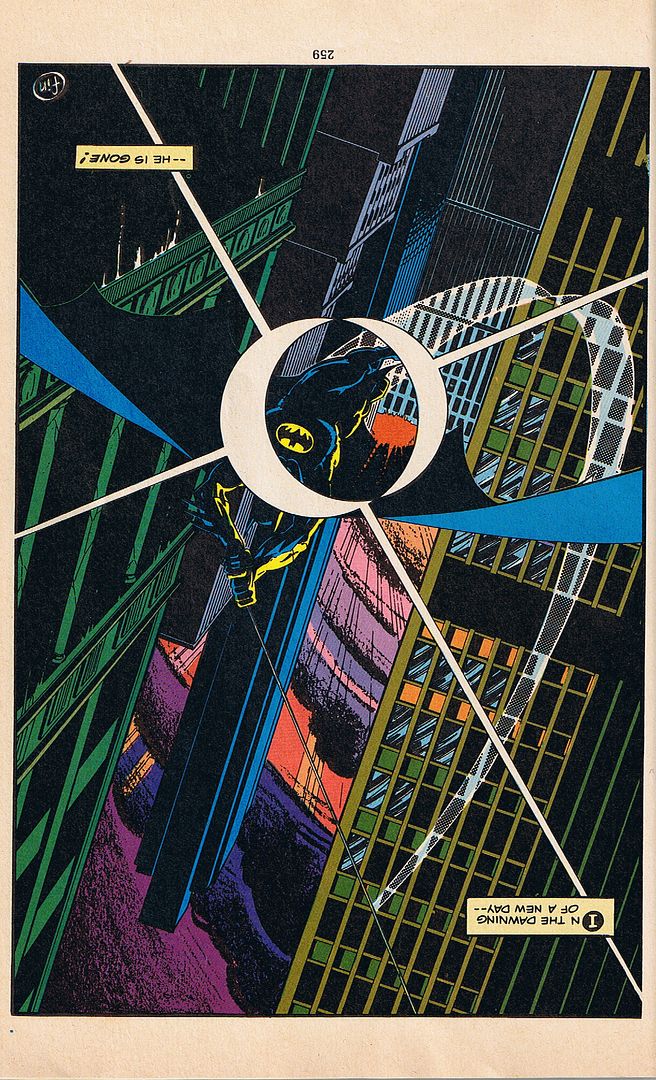
There were two more issues in Englehart's run, both of which are included in the Strange Apparitions collection and feature Clayface III, but I'm of the opinion that the core story ends right here. I mean, really, that's a perfect finale to a Bat-epic right there.
Of course, while Hugo is dead, that isn't his last appearance. I have three more posts to make before we come to the post-Crisis reboot and reimagining of Hugo for the new continuity. But as for the exact nature of his return (as well as the return of Boss Thorne!)... well, those are each mysteries unto themselves, as you'll see.
If you'd like to read all of Strange Apparitions yourself, I wish you the best of luck. As previously stated, this beloved classic is bizarrely out of print. If you're up for scouring back issue bins and/or the internet, the story's been collected in trade paperback, which itself is a collection of the five-issue miniseries Shadow of the Batman, which reprinted the original issues. Basically, find it any way you can until DC comes to their senses.
If you haven't--or if you've only read Fish on its own but not the surrounding story--you should at least know that it's generally considered one of the finest Batman stories of all time. I certainly agree, but I don't want to oversell it as a work, since hyped expectations have killed many a great story. I can at least safely presume to call it one of the most important and influential Batman comics of all time, and for that alone I urge you to track down the trade paperback.
Or at least, I would, if it weren't out of print. WTF, DC?
I was actually tempted to post the entire storyline here, but I had a hard enough time singling out the Hugo Strange subplot while keeping these scans under the 1/3rd limit. The story is just that tight, with each issue packed to the gills with plot, action, and character stuff.
So with regret, let's eschew the excellent stories of Bruce and Silver St. Cloud's affair, of the introduction of Dr. Phosphorus and the reintroduction of Deadshot, of the thieving Penguin and tragic Clayface III, and even of the greatest Joker scheme of all time.
Instead, let's focus on the grand return of Batman's first arch-nemesis, and the scheming villain who made the damn fool mistake of crossing him:

These scans (encompassing Detective Comics #471-476) begin with the story already in progress, so I'll let one of our key players fill you in on the events:

So Thorne and the council plot to finish off Batman, not realizing that he didn't come away unscathed from his battle with Dr. Phosphorus:

These days, Batman would take his problem to someone else in the super-community like Dr. Mid-Nite or, hell, maybe even treat himself because he's the Bat-God of Medicine or something. But no, Bronze Age Bruce has a different plan:


***cue an awesome full-page Marshall Rogers nightmare image that I had to cut for page limit restrictions***

Producing a costume that he'd kept in a hidden compartment, Batman manages to melt the bars and escape his cell:

Yep, it's a pair of Monster Men! Which means that Dr. Todhunter is really...


... wait, he has trained attack snakes? I'd say that's silly, but Hugo is so gloriously old-school arch-villain that I can accept it. He'd surely climb the ranks in the Guild of Calamitous Intent.

Of all the villains who've had Batman unconscious and at their mercy, Hugo was the only one with the insight to go, "Hey, maybe I should unmask this guy! God, I'm smart!"
This makes Hugo the second villain to have learned Bruce's identity, the first being Ra's al Ghul. But as much of a threat Ra's is, he never really exploited the secret identity. Now, if any of the other villains discovered that Bruce was Batman, they'd likely just use it as a means to destroy their enemy.
What sets Hugo apart is that he has a far grander goal in mind:



For the second time, we learn what Hugo had been doing since his faked death: he was a highly successful professional criminal in Europe.
In the previous post, jlroberson and I discussed how easily Hugo could have been used in place of Dr. Hurt in Grant Morrison's Batman R.I.P. (keep reading these posts and you'll notice more and more ways that Hurt has cribbed from Strange). If they had, one could easily imagine that Hugo spent those years amassing power with the Black Glove criminals. Major missed opportunity, that.
Furthermore, Dr. Hurt isn't the only so-called "ultimate Batman villain" to have ripped off Hugo. Take Hush, for instance, and the fact that Hugo pulled his scheme way earlier while still being a far more interesting character in the process:

Hugo's got everything planned out, even going to far as kidnapping Alfred and throwing him in the cell with Bruce. Robin's on the case, but Hugo's one step ahead of them the whole way:

Awww, does Hugo have a bit of a hate-crush on Batman? Actually, yes, yes he does.
Resisting these strange new feelings, Hugo grabs a pair of Monster Men and--dressed in his best evil finery--holds a sinister auction:



See, that's the big problem with Hugo's plan here: involving other villains he can't command.
Now, it wasn't necessarily stupid to involve the Joker and the Penguin. Yes, screwing them over would be inviting suicide, but Hugo's already proven himself smart and capable enough of actually, possibly getting away with it.
Besides, Hugo's line about "play by the rules," indicates more than just the rules of his own personal game. Indeed, it's a game that Hugo, the Penguin, and the Joker all play with Batman in their own ways, a game that a crass thug like Rupert Thorne could never understand.
Only too late does Hugo himself come to this realization:



Batman and Robin bust the thugs for being Rupert Thorne's men, then immediately start wondering where he hell Hugo Strange has gone. Man, the guy dies, and no one notices!

Oh, shut up, Dick. ... Sorry, force of habit.
So Hugo actually healed Bruce! Why, if he was already planning to kill Bruce and leave a corpse for the "lucky winner" to find? Did Hugo have a change of heart? If so, when? Did he cure Bruce's radiation so he, Hugo, could have the entire pleasure of Batman's murder himself? Or was his subconscious admiration for Batman just too great?
Perhaps the more pressing question is this: if Hugo's finally dead, why do I still have a bunch of scans from this storyline?


Later, amid the return of Deadshot (in the story which gave him the costume he still wears to this very day), Batman decides to pay Thorne a personal visit:


I like how Ghost?Hugo is naked, but still wears glasses. Guy has his priorities, even when he's dead.
We're breezing past an awful lot of story to focus on the Thorne subplot, story which mainly involves the romantic drama between Bruce and Silver St. Cloud, who has also discovered his secret identity.
And it all comes to a head when the Joker finally emerges in The Laughing Fish, a story which--if you haven't read it or seen the episode--features the Joker killing off bureaucrats because he cannot legally trademark fish. I could explain more, but really, do you need me to?
I was seriously tempted to post the Fish storyline here, but this post is long enough as it is. So instead, let's check in with ol' Rupe:


Yes, Rupe, just like Hugo Strange! Because Hugo and the Joker both understand something that you never could. They understand--and adore!--the game they play with Batman.
By the way, even from the snippet of a story, I honestly think Englehart's Joker to be my favorite Joker of all time. Somewhere between this and TAS Joker is my ideal Mr. J, mainly because his schemes actually follow an insane pattern of logic, only the absurd logic of an actual joke. He's genuinely absurd, and genuinely terrifying.

"... but the Batsignal!" As Thorne drives off, the Joker claims two victims, and names Commissioner Gordon as his intended third. Frustrated at his second failure, Batman searches around the crime scene for any clues he can find:

Since Hugo is officially dead (as I gather from the editorial note by Julie Schwartz), and Batman can see the ghost, then the only possible answer is that it truly is Hugo's spirit and not Rupert Thorne hallucinating. In fact, it's a spirit that's taking an active interest not just in Thorne, but in Batman's investigation. Why?
As Batman wonders that himself, I hope you'll forgive my indulgence in including one more bit of Englehart's Joker:

... to Rupert Thorne, still driving to the middle of nowhere, desperate for any companion to take his mind off Hughost.



So Hughost helped Batman capture the Joker? Why? What did Hugo have to gain by helping Batman defeat the Joker? Was it out of pure respect from beyond the grave? In dying, did Hugo himself attain some form of redemption? Perhaps his brief time inhabiting Bruce's life made more of an impact on Hugo than he'd expected. Either way, we get no answers, and it's that ambiguity which gives this story so much of its lasting power.
By the end, Bruce saves the day, but loses the woman he loves:


There were two more issues in Englehart's run, both of which are included in the Strange Apparitions collection and feature Clayface III, but I'm of the opinion that the core story ends right here. I mean, really, that's a perfect finale to a Bat-epic right there.
Of course, while Hugo is dead, that isn't his last appearance. I have three more posts to make before we come to the post-Crisis reboot and reimagining of Hugo for the new continuity. But as for the exact nature of his return (as well as the return of Boss Thorne!)... well, those are each mysteries unto themselves, as you'll see.
If you'd like to read all of Strange Apparitions yourself, I wish you the best of luck. As previously stated, this beloved classic is bizarrely out of print. If you're up for scouring back issue bins and/or the internet, the story's been collected in trade paperback, which itself is a collection of the five-issue miniseries Shadow of the Batman, which reprinted the original issues. Basically, find it any way you can until DC comes to their senses.